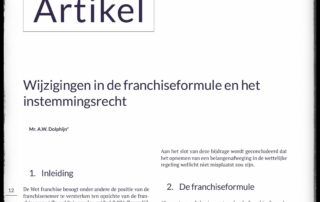Change in store franchisee’s entrance to be regarded as a defect?
Court of Roermond
The court in Roermond was recently confronted with the following issue, of which it can be safely assumed that such situations will occur several times in the Netherlands every year. What was going on? Eight years ago, supermarket chain Jan Linders concluded a lease with the owner of business premises in the basement of a shopping center to operate a ‘Jan Linders’ supermarket there. At the time Jan Linders entered into the lease, the shopping center had two entrances (or exits). One entrance was relatively close to the supermarket and the other entrance was 130 meters away.
However, it wouldn’t stay that way. In 2010 it was announced that the shopping center would be thoroughly renovated, partly due to vacancy. Although the verdict refers to a “ large-scale ” renovation, this was apparently not so extreme that premature termination of the lease with Jan Linders was necessary. That is of course nice. Unfortunately, during this renovation, the entrance closest to the supermarket will be converted into an entrance plus retail space. The ‘converted’ entrance is therefore actually retained as an entrance, but customers of the shopping center now have to walk through a retail space.
Jan Linders states that, because the entrance has been converted into an entrance plus retail space, some of its customers stay away and it therefore misses out on sales. Apparently, certain customers of Jan Linders would not be prepared to enter another retail space in order to get to the supermarket. Because there is also a retail space, with more limited shop opening hours than a ‘normal’ entrance, the influx of customers is further limited. Using the other entrance, 130 meters away, is apparently not an option for (certain) customers of Jan Linders. Add to this the fact that there are various competing supermarket chains that are (more) easily accessible for customers and the suffering for Jan Linders is complete, according to his own words. However, the landlord is of the opinion that Jan Linders is ” in no way ” hindered in the operation of the supermarket, so that the latter is forced to take legal measures.
After hearing the views of both parties, the judge will consider whether the conversion of the one entrance into an entrance plus retail space can be qualified as a defect within the meaning of the law. The court notes that the term “ defect ” should be interpreted broadly and that the valuation of this term is determined by what Jan Linders could expect on the basis of the lease. To assess whether the renovation of the entrance is indeed a defect, the judge compares the situation before the renovation with the situation after the renovation. For example, the court finds a considerable difference in hours in the possible influx of customers, because the entrance is only open during shop opening hours in the current situation.
Despite the foregoing, the judge is ultimately not inclined to speak of a defect in the rented property. Jan Linders may expect that the rented supermarket will be easily accessible for shoppers, but according to the court this is also the case. After all, according to the judge, there is still an entrance, despite the fact that customers now also have to enter a retail space. It is also clearly visible through a billboard that there is a ‘Jan Linders’ supermarket in the shopping center and the entrance, which is 130 meters away, was always more important than the renovated entrance. The judge also believes that customers can use the entrance/shop space at the most important times of the day, i.e. between 9 a.m. and 6 p.m. Outside these times, the other entrance can be used. In short, Jan Linders’ claim is rejected.
In the absence of an own assessment of the actual situation on the spot, it would be (too) simplistic to make a final judgment in this article about the court’s verdict in this matter. However, the following can be noted. Although the term “ deficiency ” has a broad meaning according to the legislator, it seems as if Jan Linders had apparently insufficiently substantiated, or could not have substantiated, in these proceedings. This is because the court, for example, refers to “ alleged loss of turnover ”.
There is at least one lesson to be learned from this judgment. If and insofar as you operate a business in a shopping center where major renovations are to be expected, do not hesitate to immediately properly record information regarding, for example, turnover and customers, for example by means of an expert report. If this is waited until after the relevant renovation and only at the moment when there may be fewer customers, so a loss of turnover, then it is possible that vital information will be lost. In that case it may no longer be possible to (fully) demonstrate that there is indeed a defect in the rented property. In those cases, the investment in an expert in advance can pay for itself later.
Mr JH Kolenbrander – Franchise attorney
Ludwig & Van Dam Franchise attorneys, franchise legal advice Would you like to respond? Mail to info@ludwigvandam.nl

Other messages
Mitigation of fine due to ‘dominant position’ of franchisor
Mitigation of fine due to 'dominant position' of franchisor ...
It is a non-competition clause at the end of the lease
In the judgment of 26 March 2024, ECLI:NL:GHSHE:2024:1035, the Court ...
Looking ahead: Bottlenecks at the end of the franchise agreement
Of course, everyone starts a collaboration with good courage. But ...
Not just a successful appeal to incorrect forecasts
Not just a successful appeal to incorrect forecasts Introduction ...
Changes to the franchise formula and the right of consent
An article by Mr. was published in the leading legal ...
The National Franchise podcast
Guests on the National Franchise podcast are: Theodoor Ludwig ...







